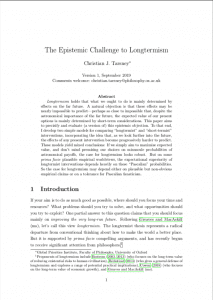The epistemic challenge to longtermism
Christian Tarsney (Global Priorities Institute, University of Oxford)
GPI Working Paper No. 3-2022, published in Synthese
Longtermists claim that what we ought to do is mainly determined by how our actions might affect the very long-run future. A natural objection to longtermism is that these effects may be nearly impossible to predict— perhaps so close to impossible that, despite the astronomical importance of the far future, the expected value of our present actions is mainly determined by near-term considerations. This paper aims to precisify and evaluate one version of this epistemic objection to longtermism. To that end, I develop two simple models for comparing ‘longtermist’ and ‘neartermist’ interventions, incorporating the idea that it is harder to make a predictable difference to the further future. These models yield mixed conclusions: if we simply aim to maximize expected value, and don’t mind premising our choices on minuscule probabilities of astronomical payoffs, the case for longtermism looks robust. But on some prima facie plausible empirical worldviews, the expectational superiority of longtermist interventions depends heavily on these ‘Pascalian’ probabilities. So the case for longtermism may depend either on plausible but non-obvious empirical claims or on a tolerance for Pascalian fanaticism.
Other working papers
Critical-set views, biographical identity, and the long term – Elliott Thornley (Global Priorities Institute, University of Oxford)
Critical-set views avoid the Repugnant Conclusion by subtracting some constant from the welfare score of each life in a population. These views are thus sensitive to facts about biographical identity: identity between lives. In this paper, I argue that questions of biographical identity give us reason to reject critical-set views and embrace the total view. I end with a practical implication. If we shift our credences towards the total view, we should also shift our efforts towards ensuring that humanity survives for the long term.
On the desire to make a difference – Hilary Greaves, William MacAskill, Andreas Mogensen and Teruji Thomas (Global Priorities Institute, University of Oxford)
True benevolence is, most fundamentally, a desire that the world be better. It is natural and common, however, to frame thinking about benevolence indirectly, in terms of a desire to make a difference to how good the world is. This would be an innocuous shift if desires to make a difference were extensionally equivalent to desires that the world be better. This paper shows that at least on some common ways of making a “desire to make a difference” precise, this extensional equivalence fails.
How to resist the Fading Qualia Argument – Andreas Mogensen (Global Priorities Institute, University of Oxford)
The Fading Qualia Argument is perhaps the strongest argument supporting the view that in order for a system to be conscious, it does not need to be made of anything in particular, so long as its internal parts have the right causal relations to each other and to the system’s inputs and outputs. I show how the argument can be resisted given two key assumptions: that consciousness is associated with vagueness at its boundaries and that conscious neural activity has a particular kind of holistic structure. …

